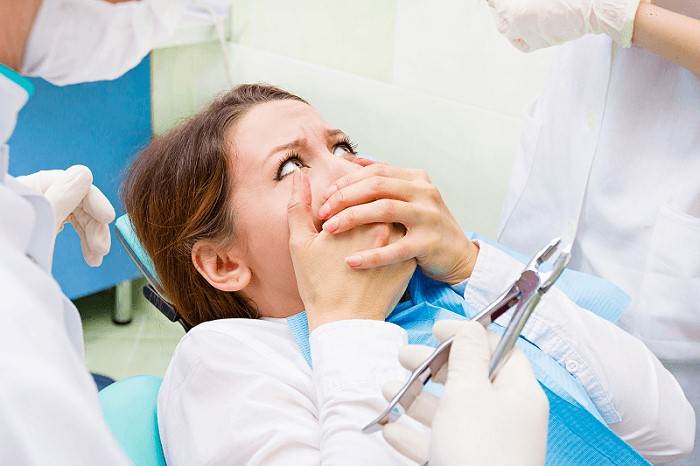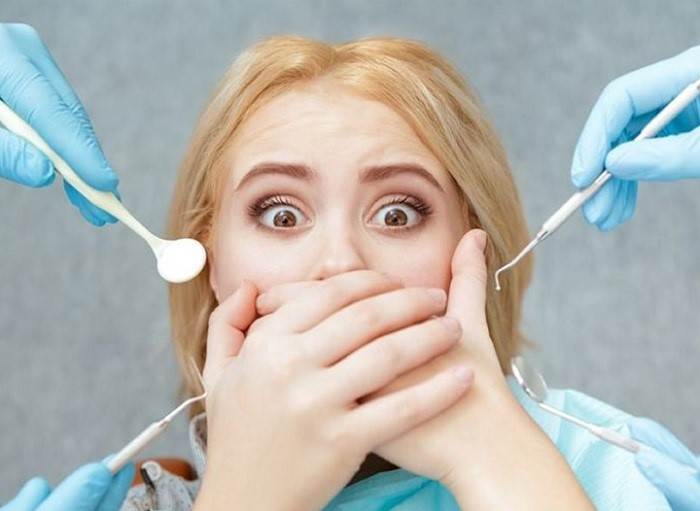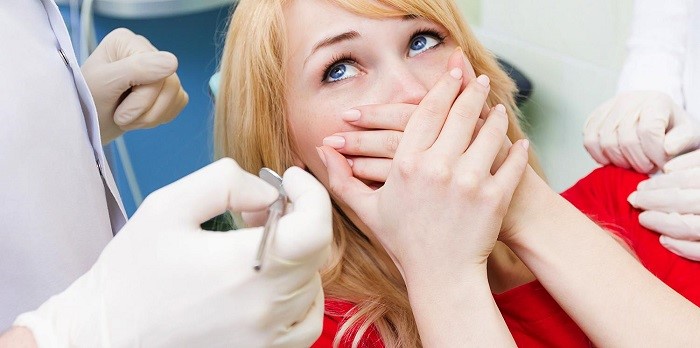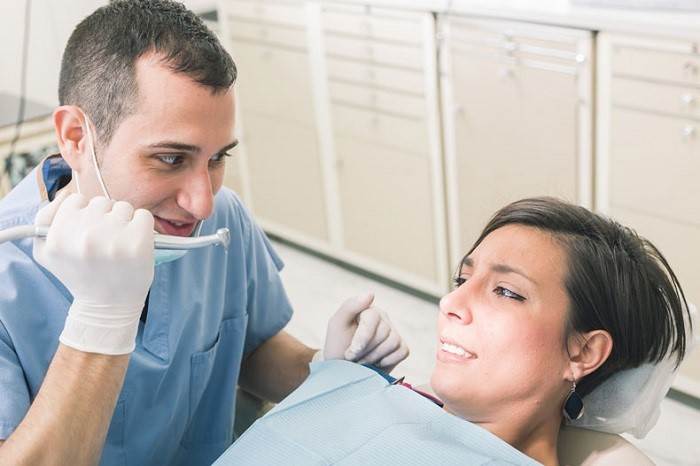If you fear going to the dentist, you are not alone. Many people avoid going to the dentist because of anxiety or fear. People with dental anxiety have a sense of uneasiness about the upcoming dental appointment. They may also have exaggerated worries or fears. Dental phobia is a more serious condition that leaves people panic-stricken and terrified. People with dental phobia have an awareness that the fear is totally irrational but are unable to do much to change it.
If you have avoided professional dental care because you suffer from dental anxiety, there are experienced dentists that can help you. dentists can help you manage the most common causes of dental phobia. it is important to choose the right dentist.
What causes dental phobia and anxiety?
The most common cause of dental phobia is a negative dental experience in the past. If a person goes to the dentist and receives poor treatment, or has a bad reaction to dental care, they are more likely to feel stress and anxiety the next time it comes to schedule a dental appointment. Dental phobia is an especially common reaction when a negative dental experience occurs while a person is a child. This can lead to a lifelong fear of the dentist. Following are some dental experiences that are most likely to cause dental phobia:
Fear of pain
Fear of pain is a common reason for avoiding the dentist. The fear usually stems from an early dental experience that was unpleasant or painful, or from dental “horror” stories they have heard. Thanks to the many advances in dentistry made over the years, most of today’s dental procedures involve considerably less pain and often none at all.
Fear of injection or that the injection won’t work
Many are terrified of needles, especially when inserted into the mouth. Others fear that the anesthesia hasn’t yet taken effect or isn’t a large enough dose to knock out pain before the procedure begins.
Fear of anesthetic side effects
Potential side effects of anesthesia such as dizziness, feeling faint, or nausea produce fear in some people. Others don’t like the numbness or “fat lip” associated with local anesthetics.
Feelings of helplessness and loss of control
As they sit in a dentist’s chair with mouth wide open, unable to see what’s going on, some people feel helpless and that they are out of control of the situation.
Embarrassment and loss of personal space
Many people are uncomfortable with the dentist or hygienist working so physically close to their face. Others may feel self-conscious about the appearance of their teeth or possible mouth odors.
Poor Oral Health
Patients who have neglected at-home oral hygiene habits or routine preventative dentistry treatments will probably have poor oral health. These patients can benefit the most from restorative dentistry treatments to address dental complications. Unfortunately, poor oral health or a neglect of dental care is a common cause of dental phobia. When a person knows they will need extensive dental care to restore the strength of the smile, they may be afraid to schedule a dental exam. Many patients who suffer from poor oral health also fear that they will be judged or reprimanded by the dentist for letting their smile get to the state it is in.
What are the signs of dental phobia?
People with a dental phobia do everything possible to avoid going to the dentist, going only when forced to by extreme pain. Other signs of dental phobia include:
- Trouble sleeping the night before the dental exam
- Feelings of nervousness that worsen in the dentist’s waiting room
- Getting to the dentist’s office but being unable to enter
- Crying or feeling physically ill at the very thought of visiting the dentist
- Intense uneasiness at the thought of, and actually when, a dentist or hygienist places objects in your mouth, suddenly feeling like it is difficult to breathe
How to manage dental anxiety or phobia
There are many ways to help people manage dental anxiety or phobia. It is important to let the dentist know if you experience any level of dental anxiety. Open discussion around the individual triggers of anxiety can help the dentist work with you to tailor a treatment plan for you.
Some coping techniques that can assist some individuals include:
- deep breathing
- meditation
- distraction (such as listening to music or the use of screens)
- guided imagery
- progressive muscle relaxation
Referral to a psychologist can be helpful too. Short targeted therapies including cognitive behavioural therapy can be very successful.
Severe dental anxiety or phobia may require management with relative analgesia (happy gas), anxiety relieving medication, conscious sedation (twilight sedation) or general anaesthesia.
Relative analgesia (happy gas)
Known as happy gas or laughing gas, nitrous oxide can help people relax during dental treatment. A mask is fitted to your face, and you breathe a mixture of oxygen and nitrous oxide. It takes effect within a few minutes and wears off quickly.
You will feel relaxed but will still be awake. You can talk to the dentist, and hear what they say to you, but you won’t necessarily remember everything once the visit is over.
For most people, the relaxed sensation created by nitrous oxide sedation is very pleasant. Occasionally people don’t like the sensation it creates, and other options can be considered.
Anxiety relieving medication (oral anxiolytic tablets)
Oral anxiety relieving (anxiolytic) medications (such as temazepam) are sometimes prescribed by dentists or doctors to help anxious patients relax. A short-acting, small, single dose is usually taken one hour before the dental appointment.
Medication should only be taken following discussion with your dentist or doctor. You will need someone to accompany you to and from the dental visit as you cannot safely drive a car while under the influence of anxiolytic medication.
Conscious sedation
This type of sedation involves receiving medication through a drip placed into a vein of the arm or hand. Intravenous (IV) sedation is provided by a dental sedationist (a dentist with advanced training in sedation) or an anaesthetist. It can be undertaken at a dental practice that has additional equipment, or in a hospital.
Under IV sedation, patients are relaxed and may drift off into a light sleep, but they can respond to verbal prompts. Possible side effects include drowsiness and nausea after the procedure. Patients should not drive themselves home after intravenous sedation. Not all dentists offer treatment under sedation. Some pre-existing medical conditions or medications may affect the type of sedation you can have. Talk to your dentist for further information.
General anaesthesia
Treatment under a general anaesthetic is carried out in a hospital setting by the dentist and anaesthetist. General anaesthesia involves patients being ‘fully asleep’. Some possible side effects include nausea and a longer recovery time than other forms of sedation.
A general anaesthetic can be a good option for some people, but remember that it doesn’t help you learn coping strategies for anxiety or get used to going to see the dentist.
You will need both pre- and post-operative visits to the dentist. The anaesthetist will also need to assess you prior to the general anaesthetic. Patients cannot drive themselves home after a general anaesthetic.
Some dental treatments are better provided over several visits. This means that your treatment options may be more limited if you want all your dental treatment under general anaesthetic. Some people need a lot of treatment and it may not be possible to get enough anaesthetic time to finish all the treatment in one session.
In some instances, having some treatment done in the dental chair before the general anaesthetic will help prepare the mouth for the treatment that will be provided, to make best use of the general anaesthetic session. General anaesthetic works best when used in conjunction with other strategies, so that some treatments can be done without general anaesthetic. This way, the general anaesthetic session time is kept for the treatments that are most difficult to cope with.
Tips to ease dental fear
In fact, if your dentist doesn’t take your fear seriously, find another dentist. The key to coping with dental anxiety is to discuss your fears with your dentist. Once your dentist knows what your fears are, he or she will be better able to work with you to determine the best ways to make you less anxious and more comfortable.
Here are some strategies to help you cope with dental anxiety and phobia:
- Find an understanding dentist. Ask friends and family, or look for someone who specialises in treating anxious patients. Search for your local dentists here.
- Once you’ve found someone you think may be suitable, visit the surgery to have a look around, meet the receptionist and dentist and see the environment. Tell the dentist that you’re anxious and what your fears are, so they know beforehand.
- Pick an appointment time early in the morning so you have less time to dwell on it.
- The first appointment will simply be a check-up so don’t worry about having any treatment. See this first visit as your chance to get to know the dentist.
- Take a friend with you to your appointment. The dentist won’t mind if they accompany you throughout the check-up or treatment.
- If you think it will help, start gradually with a clean and polish then work up to other treatments, such as fillings, once you’ve built up trust and rapport with your dentist.
- Talk to the dentist about using a numbing gel if you have a fear of needles.
- Use headphones to listen to music during your visit. It may help you relax.
- If lack of control is one of your main stressors, actively participate in a discussion with your dentist about your treatment to ease your tension.
- Ask your dentist to explain what’s happening at every stage of the procedure to help you mentally prepare for what’s to come.
- Establish a signal – such as raising your hand – when you want the dentist to stop immediately. Use this signal whenever you are uncomfortable, need to rinse your mouth or simply catch your breath.






